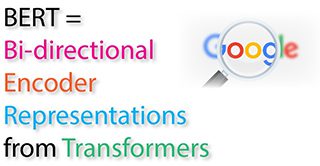WHY GOOGLE IS APPLYING BERT TO SEARCH

With the implementation of the new BERT algorithm, Google has made another significant shift in the way results will appear in Google search. Understanding what the BERT algorithm update changes, and doesn’t change, with regards to SEO will be crucial to maintaining your existing presence in search, as well as establishing a new presence in search.
Google is constantly tweaking its super-secret search algorithm. Generally, these tweaks are small and not significant enough to cause massive, sudden shifts in search results the way Panda and Hummingbird did. That is not the case with the BERT update. BERT represents a seismic shift in the content landscape and is certain to impact almost every company’s approach to content development and SEO.
With the introduction of the BERT algorithm, many companies will see sudden changes in search results, for better or worse. And considering the way many companies approach content marketing today, the “worse” case is probably more likely. But more on that in a minute.
What is the BERT Algorithm?
So, what is BERT, and why the change now? That question is best answered using a reference from a recent blog post by Google’s Pandu Nayak, Google Fellow and Vice President, Search for Google. From his blog post: “With the latest advancements from our research team in the science of language understanding – made possible by machine learning – we’re making a significant improvement to how we understand queries, representing the biggest leap forward in the past five years, and one of the biggest leaps forward in the history of search.”

Sounds like we should sit up and take notice, right?
Machine learning, a mathematical way of interpreting patterns and speech processes in written and spoken language, is advancing the science of search. One result of this advancement is BERT, which stands for Bi-directional Encoder Representations from Transformers. According to Nayak, “[BERT] enables anyone to train their own state-of-the-art question answering system.”
In the remainder of this post, I’ll dig more into this topic and how BERT will, or should impact your approach to SEO and content development. As well as how this change should alter your short- and long-term visibility and presence in search.
What is Machine Learning?
Transformers (the “T” in BERT), according to Google, are “models that process words in relation to all the other words in a sentence, rather than one by one in order.” This means that BERT machine learning models will now parse the full context of a sentence or phrase in a query by examining words that come before and after it. According to Google, this contextual analysis, rather than a specific keyword association with a topic, is a superior process for understanding the intent behind search queries. The result is a more advanced approach to SEO by Google.
Particularly with regards to longer conversational-centric queries, which are becoming more and more common in today’s search devices driven by voice-based devices like Amazon’s Alexa or Apple’s Siri, a machine learning algorithm will be able to do a much better job of understanding the contextual meaning and purpose of a sentence where prepositions are used to qualify the query.
In other words, Google search will now be able to more clearly understand the context of a string of words in your query. This means users can and will increasingly search in a way that feels natural and Google will be able to understand and respond to the search query more accurately.
In his blog post on the subject, Google’s Nayak uses this example of a query: “2019 Brazil traveler to USA needs a Visa.” Nayak points out that the word “to” and its relationship to the rest of the query is vital to understanding the meaning of the query. It’s about a Brazilian traveling to the U.S. and not the other way around. And it’s related to the need for an official travel document and not a credit card. (See a related example of this type of results-centric query below, using the phrase “math practice books for adults.”)
Nayak points out that past versions of the Google algorithm would not be able to pick up on the importance of the query’s context using the word “to.” So, using the old algorithm, Google might actually return a listing of results about U.S. citizens traveling to Brazil, as opposed to the other way around. With BERT, Google is now able to grasp this level of nuance — the use of the word “to” as a qualifier — and return a much more relevant result for the query.
With its new way of understanding of contextual nuances, the BERT algorithm changes the landscape, and the day-to-day practice of SEO, diminishing the value of keyword- and keyword phrase-based SEO. Keywords and phrases still matter with regards to strategic direction and understanding of the competitive landscape as it relates to high-level content strategy and content marketing. But the keyword analytics approach to SEO with regards to improving rankings now has less value and impact.
Understanding the impact of this change is essential to success in search moving forward. This is because BERT understands the context of a search query at the sentence level, including word order and synonyms. Before BERT, Google relied on exact keyword and keyword phrase association to determine search rankings and relevance.
A secondary reason why Google has evolved to embrace a machine learning model such as BERT has to do with trends in the way searches are increasingly done today. Two of these trends are the increasing use of longtail keyword queries and the increasing presence of voice search in devices such as Amazon’s Alexa and Apple’s Siri.
How Does BERT Change SEO Strategy?
To reiterate a key point, BERT shifts the primary focus of a solid SEO strategy from a focus on keywords and keyword phrases to that of Topics. This broader focus on Topical relevance with regards to search queries will most likely require a shift in the way you are handling the development of web pages, blogs, and PR materials like press releases.
Here are some things you should begin doing — or should stop doing — to address the BERT algorithm changes.
- Stop using low-quality outsourced content development resources. The use of outsourced bloggers or content farms that have little knowledge or expertise within your business category or sector is now going to hurt your SEO rankings. This is because rather than rankings based on keyword association and optimized wordsmithing, BERT now considers Expertise, Authority, and Trust (aka E-A-T … more about this in a minute) as its core qualifying ranking factors.
- Develop a resource list of Subject Matter Experts (SMEs). Formalize who your internal SME’s, or subject matter experts are, or will be in the future. Here’s why: SMEs are more likely to use relevant industry jargon and related synonyms and phrases in conversational language. BERT is able to pick up this level of contextual association as it relates to subject matter expertise and authority. The result, over time, will be higher and more favorable rankings.
- Use a conversational tone for your content. For example, write more in a style that matches how people actually speak as opposed to using formal or fancy wordsmithing. A good litmus test with regards to whether or not your content is conversational in tone is to use “Why?…” or “What?…” questions in the title or opening paragraph of your copy. For example, a good opening sentence on surveillance cameras might be, “What type of 4K camera do I need for a surveillance system?”
- Focus on quality versus quantity with regards to your content. For far too long, content marketers have been cranking out blase content constantly and at random using the premise that Google rewards brands for regular, consistent content updates in order to improve rankings. Content freshness does still matter, but now, content depth and quality matter more than publishing consistency and updates.
Will BERT Change My Search Rankings?
Hopefully, you have a better grasp now of the impact the BERT algorithm has on the current status and future of SEO, and your overall search rankings. The next question is obviously “Will BERT change the results I am seeing in search?”
There is not really a “yes” or “no” way to answer this question. The truthful response is “It Depends.”
If you’re using only keyword-based SEO, content farms and/or general topic writers for your content, the introduction of the BERT algorithm is a game-changer for you. And, a good sign of this being the case for your company will be a significant and sudden drop in your search rankings in the short term. (You are monitoring your search results ranking against your competitors, aren’t you?)
If your content marketing workflow and processes already centers around creating and distributing expertise-focused, authoritative content using Subject Matter Experts SMEs, it’s more than likely business as usual for you.
Chances are you are somewhere in between these two scenarios. The good news is, since you’ve gotten this far in my blog post, you now have a clearer picture of how to shift your strategy, even if it’s a slight shift, for a more successful approach to content marketing.
What Should I Do About SEO?
As I mentioned earlier, the answer to this question is, “It Depends.” No matter what stage your content development program is in, it’s likely there’s always room for improvement. Fortunately, Google has given us some guidance on how to proceed.
Let’s circle back to the E-A-T (Expertise, Authority, Trustworthiness) litmus test for content that I mentioned earlier in this post. E-A-T references the three strategic content pillars that Google deems to be important regarding the classification of qualified content on the web.
“E” stands for Expertise. If you’re not already using SMEs as cornerstones for your content development, you need to start doing this sooner than later. As an example, in a technology-based company, an SME could be a developer, programmer or product manager. “But these types of people in my company are not writers!” you might say. Or, “our developer doesn’t have time to write 2,000-word blog posts on the importance of proprietary code for systems engineering machines.”
Remember, the new standard for relevance in search is not how well wordsmithed your content is, but how authoritative and relevant it is with regards to the subject matter. And your SMEs are going to fit the bill for the baseline test of content as authoritative and expertise perfectly.
So instead of asking these people to write themselves, interview them and record the conversation. If they’re like most SMEs, they can easily generate a 2,000-word conversational-styled blog post in a 15-minute conversation with you. With this approach (a recorded conversation on the primary topic), you get the relevant industry jargon, nuances and contextual sentiments that will matter in this new era of search. Take that recording of the interview and transcribe it and use that for your blog post, press release, etc.
With just this one step, you’ve not only handled the expertise factor but by nature of interviewing a thought leader in your company and industry category, you’re also addressing the Authority, as well as the Trustworthy component of the E-A-T content strategy.
The bottom line? The BERT algorithm introduces a seismic shift in how you need to approach content creation. The goal in this new era of search is relatively simple, and actually not that much different than what it should have been all along with regards to your content marketing strategy.
That is to create and distribute authoritative, relevant, and educational content that addresses specific needs your audience has. Use digital tools and services to discover, from a broader perspective, what hot and relevant industry topics are. Based on this research, create and distribute conversational-styled content that addresses hot topics using your subject matter experts for their expertise, authority, and trustworthiness.
By applying the E-A-T approach to content marketing in the new era of the BERT algorithm, you’ll be well on your way to improved rankings in search, with increased traffic to your website, in less time than you might think.

Bill Threlkeld is president of Threlkeld Communications, Inc., a digital PR consultancy based in Santa Monica, California. Threlkeld Communications, Inc. specializes in Digital PR strategy and tactics, with a focus on integrated content campaigns. This approach to Digital PR is known as the Content Distribution Ecosystem, a unique content approach that synchronizes and integrates PR, Social Media, Blogs, Audio, Video, Email Marketing and other content.
